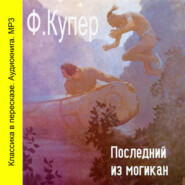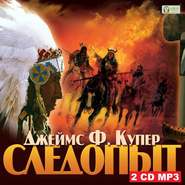По всем вопросам обращайтесь на: info@litportal.ru
(©) 2003-2024.
✖
The Redskins: or, Indian and Injin. Volume 1
Настройки чтения
Размер шрифта
Высота строк
Поля
"Come, let us take a glass of wine together, in the good old York fashion, Hugh. Your father and I, when boys, never thought of wetting our lips with the half-glass of Madeira that fell to our share, without saying, 'Good health, Mall!' 'Good health, Hodge!'"
"With all my heart, uncle Ro. The custom was getting to be a little obsolete even before I left home; but it is almost an American custom, by sticking to us longer than to most people."
"Henri!"
This was my uncle's maitre d'hotel, whom he had kept at board-wages the whole time of our absence, in order to make sure of his ease, quiet, taste, skill, and honesty, on his return.
"Monsieur!"
"I dare say" – my uncle spoke French exceedingly well for a foreigner; but it is better to translate what he said as we go – "I dare say this glass of vin de Bourgogne is very good; it looks good, and it came from a wine-merchant on whom I can rely; but Mons. Hugh and I are going to drink together, à l'Amèricaine, and I dare say you will let us have a glass of Madeira, though it is somewhat late in the dinner to take it."
"Tres volontiers, Messieurs – it is my happiness to oblige you."
Uncle Ro and I took the Madeira together; but I cannot say much in favour of its quality.
"What a capital thing is a good Newtown pippin!" exclaimed my uncle, after eating a while in silence. "They talk a great deal about their poire beurrée, here at Paris; but, to my fancy, it will not compare with the Newtowners we grow at Satanstoe, where, by the way, the fruit is rather better, I think, than that one finds across the river, at Newtown itself."
"They are capital apples, sir; and your orchard at Satanstoe is one of the best I know, or rather what is left of it; for I believe a portion of your trees are in what is now a suburb of Dibbletonborough?"
"Yes, blast that place! I wish I had never parted with a foot of the old neck, though I did rather make money by the sale. But money is no compensation for the affections."
"Rather make money, my dear sir! Pray, may I ask what Satanstoe was valued at, when you got it from my grandfather?"
"Pretty well up, Hugh; for it was, and indeed is, a first-rate farm. Including sedges and salt-meadows, you will remember that there are quite five hundred acres of it, altogether."
"Which you inherited in 1829?"
"Of course; that was the year of my father's death. Why, the place was thought to be worth about thirty thousand dollars at that time; but land was rather low in Westchester in 1829."
"And you sold two hundred acres, including the point, the harbour, and a good deal of the sedges, for the moderate modicum of one hundred and ten thousand, cash. A tolerable sale, sir!"
"No, not cash. I got only eighty thousand down, while thirty thousand were secured by mortgage."
"Which mortgage you hold yet, I dare say, if the truth were told, covering the whole city of Dibbletonborough. A city ought to be good security for thirty thousand dollars?"
"It is not, nevertheless, in this case. The speculators who bought of me in 1835 laid out their town, built a hotel, a wharf, and a warehouse, and then had an auction. They sold four hundred lots, each twenty-five feet by a hundred, regulation size, you see, at an average of two hundred and fifty dollars, receiving one-half, or fifty thousand dollars, down, and leaving the balance on mortgage. Soon after this, the bubble burst, and the best lot at Dibbletonborough would not bring, under the hammer, twenty dollars. The hotel and the warehouse stand alone in their glory, and will thus stand until they fall, which will not be a thousand years hence, I rather think."
"And what is the condition of the town-plot?"
"Bad enough. The landmarks are disappearing; and it would cost any man who should attempt it, the value of his lot, to hire a surveyor to find his twenty-five by a hundred."
"But your mortgage is good?"
"Ay, good in one sense; but it would puzzle a Philadelphia lawyer to foreclose it. Why, the equitable interests in that town-plot, people the place of themselves. I ordered my agent to commence buying up the rights, as the shortest process of getting rid of them; and he told me in the very last letter I received, that he had succeeded in purchasing the titles to three hundred and seventeen of the lots, at an average price of ten dollars. The remainder, I suppose, will have to be absorbed."
"Absorbed! That is a process I never heard of, as applied to land."
"There is a good deal of it done, notwithstanding, in America. It is merely including within your own possession, adjacent land for which no claimant appears. What can I do? No owners are to be found; and then my mortgage is always a title. A possession of twenty years under a mortgage is as good as a deed in fee-simple, with full covenants of warranty, barring minors and femmes covert."
"You did better by Lilacsbush?"
"Ah, that was a clean transaction, and has left no drawbacks. Lilacsbush being on the island of Manhattan, one is sure there will be a town there, some day or other. It is true, the property lies quite eight miles from the City Hall; nevertheless, it has a value, and can always be sold at something near it. Then the plan of New York is made and recorded, and one can find his lots. Nor can any man say when the town will not reach Kingsbridge."
"You got a round price for the Bush, too, I have heard, sir?"
"I got three hundred and twenty-five thousand dollars, in hard cash. I would give no credit, and have every dollar of the money, at this moment, in good six per cent. stock of the States of New York and Ohio."
"Which some persons in this part of the world would fancy to be no very secure investment."
"More fools they. America is a glorious country, after all, Hugh; and it is a pride and a satisfaction to belong to it. Look back at it, as I can remember it, a nation spit upon by all the rest of Christendom – "
"You must at least own, my dear sir," I put in, somewhat pertly, perhaps, "the example might tempt other people; for, if ever there was a nation that is assiduously spitting on itself, it is our own beloved land."
"True, it has that nasty custom in excess, and it grows worse instead of better, as the influence of the better mannered and better educated diminishes; but this is a spot on the sun – a mere flaw in the diamond, that friction will take out. But what a country – what a glorious country, in truth, it is! You have now done the civilized parts of the old world pretty thoroughly, my dear boy, and must be persuaded, yourself, of the superiority of your native land."
"I remember you have always used this language, uncle Ro; yet have you passed nearly one-half of your time out of that glorious country, since you have reached man's estate."
"The mere consequence of accidents and tastes. I do not mean that America is a country for a bachelor, to begin with; the means of amusement for those who have no domestic hearths, are too limited for the bachelor. Nor do I mean that society in America, in its ordinary meaning, is in any way as well-ordered, as tasteful, as well-mannered, as agreeable, or as instructive and useful, as society in almost any European country I know. I have never supposed that the man of leisure, apart from the affections, could ever enjoy himself half as much at home, as he may enjoy himself in this part of the world; and I am willing to admit that, intellectually, most gentlemen in a great European capital live as much in one day, as they would live in a week in such places as New York, and Philadelphia, and Baltimore."
"You do not include Boston, I perceive, sir."
"Of Boston I say nothing. They take the mind hard, there, and we had better let such a state of things alone. But as respects a man or woman of leisure, a man or woman of taste, a man or woman of refinement generally, I am willing enough to admit that, cæteris paribus, each can find far more enjoyment in Europe than in America. But the philosopher, the philanthropist, the political economist – in a word, the patriot, may well exult in such elements of profound national superiority as may be found in America."
"I hope these elements are not so profound but they can be dug up at need, uncle Ro?"
"There will be little difficulty in doing that, my boy. Look at the equality of the laws, to begin with. They are made on the principles of natural justice, and are intended for the benefit of society – for the poor as well as the rich."
"Are they also intended for the rich as well as the poor?"
"Well, I will grant you a slight blemish is beginning to appear, in that particular. It is a failing incidental to humanity, and we must not expect perfection. There is certainly a slight disposition to legislate for numbers, in order to obtain support at the polls, which has made the relation of debtor and creditor a little insecure, possibly; but prudence can easily get along with that. It is erring on the right side, is it not, to favour the poor instead of the rich, if either is to be preferred?"
"Justice would favour neither, but treat all alike. I have always heard that the tyranny of numbers was the worst tyranny in the world."
"Perhaps it is, where there is actually tyranny, and for a very obvious reason. One tyrant is sooner satisfied than a million, and has even a greater sense of responsibility. I can easily conceive that the Czar himself, if disposed to be a tyrant, which I am far from thinking to be the case with Nicholas, might hesitate about doing that, under his undivided responsibility, which one of our majorities would do, without even being conscious of the oppression it exercised, or caring at all about it. But, on the whole, we do little of the last, and not in the least enough to counterbalance the immense advantages of the system."
"I have heard very discreet men say that the worst symptom of our system is the gradual decay of justice among us. The judges have lost most of their influence, and the jurors are getting to be law-makers, as well as law-breakers."
"There is a good deal of truth in that, I will acknowledge, also; and you hear it asked constantly, in a case of any interest, not which party is in the right, but who is on the jury. But I contend for no perfection; all I say is, that the country is a glorious country, and that you and I have every reason to be proud that old Hugh Roger, our predecessor and namesake, saw fit to transplant himself into it, a century and a half since."
"I dare say now, uncle Ro, it would strike most Europeans as singular that a man should be proud of having been born an American – Manhattanese, as you and I both were."
"All that may be true, for there have been calculated attempts to bring us into discredit of late, by harping on the failure of certain States to pay the interest on their debts. But all that is easily answered, and more so by you and me as New Yorkers. There is not a nation in Europe that would pay its interest, if those who are taxed to do so had the control of these taxes, and the power to say whether they were to be levied or not."
"I do not see how that mends the matter. These countries tell us that such is the effect of your system there, while we are too honest to allow such a system to exist in this part of the world."
"Pooh! all gammon, that. They prevent the existence of our system for very different reasons, and they coerce the payment of the interest on their debts that they may borrow more. This business of repudiation, as it is called, however, has been miserably misrepresented; and there is no answering a falsehood by an argument. No American State has repudiated its debt, that I know of, though several have been unable to meet their engagements as they have fallen due."
"Unable, uncle Ro?"
"With all my heart, uncle Ro. The custom was getting to be a little obsolete even before I left home; but it is almost an American custom, by sticking to us longer than to most people."
"Henri!"
This was my uncle's maitre d'hotel, whom he had kept at board-wages the whole time of our absence, in order to make sure of his ease, quiet, taste, skill, and honesty, on his return.
"Monsieur!"
"I dare say" – my uncle spoke French exceedingly well for a foreigner; but it is better to translate what he said as we go – "I dare say this glass of vin de Bourgogne is very good; it looks good, and it came from a wine-merchant on whom I can rely; but Mons. Hugh and I are going to drink together, à l'Amèricaine, and I dare say you will let us have a glass of Madeira, though it is somewhat late in the dinner to take it."
"Tres volontiers, Messieurs – it is my happiness to oblige you."
Uncle Ro and I took the Madeira together; but I cannot say much in favour of its quality.
"What a capital thing is a good Newtown pippin!" exclaimed my uncle, after eating a while in silence. "They talk a great deal about their poire beurrée, here at Paris; but, to my fancy, it will not compare with the Newtowners we grow at Satanstoe, where, by the way, the fruit is rather better, I think, than that one finds across the river, at Newtown itself."
"They are capital apples, sir; and your orchard at Satanstoe is one of the best I know, or rather what is left of it; for I believe a portion of your trees are in what is now a suburb of Dibbletonborough?"
"Yes, blast that place! I wish I had never parted with a foot of the old neck, though I did rather make money by the sale. But money is no compensation for the affections."
"Rather make money, my dear sir! Pray, may I ask what Satanstoe was valued at, when you got it from my grandfather?"
"Pretty well up, Hugh; for it was, and indeed is, a first-rate farm. Including sedges and salt-meadows, you will remember that there are quite five hundred acres of it, altogether."
"Which you inherited in 1829?"
"Of course; that was the year of my father's death. Why, the place was thought to be worth about thirty thousand dollars at that time; but land was rather low in Westchester in 1829."
"And you sold two hundred acres, including the point, the harbour, and a good deal of the sedges, for the moderate modicum of one hundred and ten thousand, cash. A tolerable sale, sir!"
"No, not cash. I got only eighty thousand down, while thirty thousand were secured by mortgage."
"Which mortgage you hold yet, I dare say, if the truth were told, covering the whole city of Dibbletonborough. A city ought to be good security for thirty thousand dollars?"
"It is not, nevertheless, in this case. The speculators who bought of me in 1835 laid out their town, built a hotel, a wharf, and a warehouse, and then had an auction. They sold four hundred lots, each twenty-five feet by a hundred, regulation size, you see, at an average of two hundred and fifty dollars, receiving one-half, or fifty thousand dollars, down, and leaving the balance on mortgage. Soon after this, the bubble burst, and the best lot at Dibbletonborough would not bring, under the hammer, twenty dollars. The hotel and the warehouse stand alone in their glory, and will thus stand until they fall, which will not be a thousand years hence, I rather think."
"And what is the condition of the town-plot?"
"Bad enough. The landmarks are disappearing; and it would cost any man who should attempt it, the value of his lot, to hire a surveyor to find his twenty-five by a hundred."
"But your mortgage is good?"
"Ay, good in one sense; but it would puzzle a Philadelphia lawyer to foreclose it. Why, the equitable interests in that town-plot, people the place of themselves. I ordered my agent to commence buying up the rights, as the shortest process of getting rid of them; and he told me in the very last letter I received, that he had succeeded in purchasing the titles to three hundred and seventeen of the lots, at an average price of ten dollars. The remainder, I suppose, will have to be absorbed."
"Absorbed! That is a process I never heard of, as applied to land."
"There is a good deal of it done, notwithstanding, in America. It is merely including within your own possession, adjacent land for which no claimant appears. What can I do? No owners are to be found; and then my mortgage is always a title. A possession of twenty years under a mortgage is as good as a deed in fee-simple, with full covenants of warranty, barring minors and femmes covert."
"You did better by Lilacsbush?"
"Ah, that was a clean transaction, and has left no drawbacks. Lilacsbush being on the island of Manhattan, one is sure there will be a town there, some day or other. It is true, the property lies quite eight miles from the City Hall; nevertheless, it has a value, and can always be sold at something near it. Then the plan of New York is made and recorded, and one can find his lots. Nor can any man say when the town will not reach Kingsbridge."
"You got a round price for the Bush, too, I have heard, sir?"
"I got three hundred and twenty-five thousand dollars, in hard cash. I would give no credit, and have every dollar of the money, at this moment, in good six per cent. stock of the States of New York and Ohio."
"Which some persons in this part of the world would fancy to be no very secure investment."
"More fools they. America is a glorious country, after all, Hugh; and it is a pride and a satisfaction to belong to it. Look back at it, as I can remember it, a nation spit upon by all the rest of Christendom – "
"You must at least own, my dear sir," I put in, somewhat pertly, perhaps, "the example might tempt other people; for, if ever there was a nation that is assiduously spitting on itself, it is our own beloved land."
"True, it has that nasty custom in excess, and it grows worse instead of better, as the influence of the better mannered and better educated diminishes; but this is a spot on the sun – a mere flaw in the diamond, that friction will take out. But what a country – what a glorious country, in truth, it is! You have now done the civilized parts of the old world pretty thoroughly, my dear boy, and must be persuaded, yourself, of the superiority of your native land."
"I remember you have always used this language, uncle Ro; yet have you passed nearly one-half of your time out of that glorious country, since you have reached man's estate."
"The mere consequence of accidents and tastes. I do not mean that America is a country for a bachelor, to begin with; the means of amusement for those who have no domestic hearths, are too limited for the bachelor. Nor do I mean that society in America, in its ordinary meaning, is in any way as well-ordered, as tasteful, as well-mannered, as agreeable, or as instructive and useful, as society in almost any European country I know. I have never supposed that the man of leisure, apart from the affections, could ever enjoy himself half as much at home, as he may enjoy himself in this part of the world; and I am willing to admit that, intellectually, most gentlemen in a great European capital live as much in one day, as they would live in a week in such places as New York, and Philadelphia, and Baltimore."
"You do not include Boston, I perceive, sir."
"Of Boston I say nothing. They take the mind hard, there, and we had better let such a state of things alone. But as respects a man or woman of leisure, a man or woman of taste, a man or woman of refinement generally, I am willing enough to admit that, cæteris paribus, each can find far more enjoyment in Europe than in America. But the philosopher, the philanthropist, the political economist – in a word, the patriot, may well exult in such elements of profound national superiority as may be found in America."
"I hope these elements are not so profound but they can be dug up at need, uncle Ro?"
"There will be little difficulty in doing that, my boy. Look at the equality of the laws, to begin with. They are made on the principles of natural justice, and are intended for the benefit of society – for the poor as well as the rich."
"Are they also intended for the rich as well as the poor?"
"Well, I will grant you a slight blemish is beginning to appear, in that particular. It is a failing incidental to humanity, and we must not expect perfection. There is certainly a slight disposition to legislate for numbers, in order to obtain support at the polls, which has made the relation of debtor and creditor a little insecure, possibly; but prudence can easily get along with that. It is erring on the right side, is it not, to favour the poor instead of the rich, if either is to be preferred?"
"Justice would favour neither, but treat all alike. I have always heard that the tyranny of numbers was the worst tyranny in the world."
"Perhaps it is, where there is actually tyranny, and for a very obvious reason. One tyrant is sooner satisfied than a million, and has even a greater sense of responsibility. I can easily conceive that the Czar himself, if disposed to be a tyrant, which I am far from thinking to be the case with Nicholas, might hesitate about doing that, under his undivided responsibility, which one of our majorities would do, without even being conscious of the oppression it exercised, or caring at all about it. But, on the whole, we do little of the last, and not in the least enough to counterbalance the immense advantages of the system."
"I have heard very discreet men say that the worst symptom of our system is the gradual decay of justice among us. The judges have lost most of their influence, and the jurors are getting to be law-makers, as well as law-breakers."
"There is a good deal of truth in that, I will acknowledge, also; and you hear it asked constantly, in a case of any interest, not which party is in the right, but who is on the jury. But I contend for no perfection; all I say is, that the country is a glorious country, and that you and I have every reason to be proud that old Hugh Roger, our predecessor and namesake, saw fit to transplant himself into it, a century and a half since."
"I dare say now, uncle Ro, it would strike most Europeans as singular that a man should be proud of having been born an American – Manhattanese, as you and I both were."
"All that may be true, for there have been calculated attempts to bring us into discredit of late, by harping on the failure of certain States to pay the interest on their debts. But all that is easily answered, and more so by you and me as New Yorkers. There is not a nation in Europe that would pay its interest, if those who are taxed to do so had the control of these taxes, and the power to say whether they were to be levied or not."
"I do not see how that mends the matter. These countries tell us that such is the effect of your system there, while we are too honest to allow such a system to exist in this part of the world."
"Pooh! all gammon, that. They prevent the existence of our system for very different reasons, and they coerce the payment of the interest on their debts that they may borrow more. This business of repudiation, as it is called, however, has been miserably misrepresented; and there is no answering a falsehood by an argument. No American State has repudiated its debt, that I know of, though several have been unable to meet their engagements as they have fallen due."
"Unable, uncle Ro?"

















